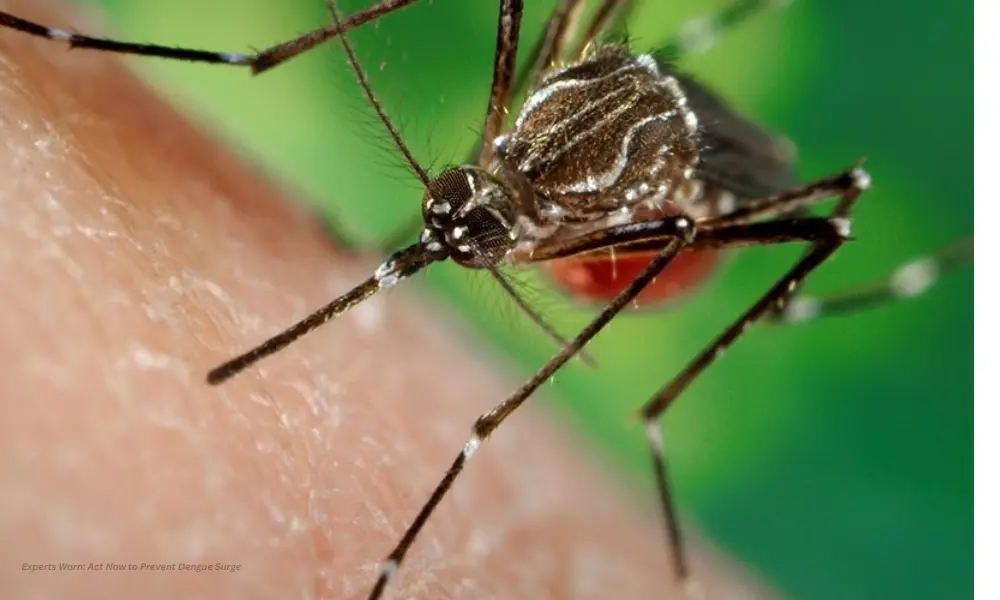Experts Warn: Act Now to Prevent Dengue Surge

Health professionals are cautioning the public that action must be taken immediately to prevent a resurgence of dengue cases. The likelihood of a possible dengue surge is growing as a result of the shifting weather patterns and elevated mosquito activity. We can better control the situation if we take action sooner. This article describes the factors that could lead to an increase in dengue, the opinions of experts, safety precautions, and the role of the government.
Table of Contents
Dengue Cases Could Increase Soon
In recent years, dengue cases have surged during warmer months in numerous areas. Mosquito populations have already increased, according to health officials, particularly in places with standing water, poor drainage, and excessive humidity. Infection rates could rise significantly in the upcoming weeks if preventive measures are not implemented soon.
Why Does Dengue Might Spread Faster?
There are several reasons why dengue might spread faster this season:
- Weather Changes: Warmer temperatures and more rain create ideal breeding grounds for mosquitoes.
- Poor Sanitation: Accumulated garbage, blocked drains, and uncovered water storage encourage mosquito growth.
- Lack of Awareness: Many people don’t realize how dengue spreads, so they don’t take the right precautions.
- Urban Overcrowding: In crowded cities, it’s harder to control mosquito populations.
- Inconsistent Prevention Measures: Not all communities are following proper mosquito control steps.
These conditions make it easier for the Aedes aegypti mosquito, which carries the dengue virus, to breed and spread the disease.
What Experts Recommend to Stop Dengue
Experts say that the key to avoiding a major dengue outbreak is to act early. Here are the top recommendations:
- Destroy Mosquito Breeding Sites: Clean up standing water from pots, tires, coolers, and drains every few days.
- Spray Regularly: Use mosquito repellent sprays in homes, offices, and public areas to reduce mosquito populations.
- Wear Protective Clothing: Long sleeves and pants help protect skin from mosquito bites.
- Raise Awareness: Communities need to be informed through campaigns, schools, and local meetings.
- Use Nets and Repellents: Sleeping under mosquito nets and applying repellents can offer personal protection.
Following these steps consistently helps reduce the chance of a dengue surge in both rural and urban settings.
Simple Ways to Protect Yourself from Dengue
Personal protection plays a big role in preventing dengue at home and in your neighborhood. Here are some easy things you can do:
- Check for Water Buildup: Make it a habit to inspect your surroundings for any water collected in buckets, bottles, or flower pots.
- Use Natural Repellents: Lemongrass, eucalyptus oil, and neem oil are effective against mosquitoes.
- Keep Doors and Windows Closed: Especially during early morning and evening hours when mosquitoes are most active.
- Install Screens: Mesh screens on windows and doors keep mosquitoes out.
- Educate Children: Teach kids about mosquito safety so they also become part of the prevention efforts.
These simple actions, done daily, can help protect you and your family from dengue infection.
What the Government Is Doing
To control the growing risk of dengue cases, many governments have started taking precautionary steps. Here’s what some local health departments are doing:
- Fumigation Drives: Spraying mosquito-prone areas to kill larvae and adult mosquitoes.
- Public Awareness Campaigns: Using media, posters, and community outreach to educate people.
- Medical Preparedness: Setting up special dengue wards in hospitals and training doctors to handle dengue symptoms early.
- School Programs: Encouraging children to practice and promote mosquito control habits.
- Monitoring Systems: Tracking mosquito activity and reporting new dengue cases regularly to respond quickly.
These actions support community efforts, but individual responsibility remains equally important.
What Happens If No Action Is Taken?
If dengue prevention measures are not implemented, the situation may rapidly spiral out of control. Dengue cases will rise quickly as a result of mosquitoes’ continued breeding and virus-transmission. Overcrowding in hospitals could result in a shortage of vital medical supplies. Individuals with weakened immune systems, particularly young people and the elderly, are more likely to experience serious side effects or perhaps pass away. As the outbreak spreads, daily life may be severely interrupted, schools may close, and workplaces may experience absenteeism. Ignoring early warnings also increases the strain on government resources and healthcare professionals. To put it briefly, if nothing is done today, there may be major health, social, and financial issues down the road.
Why Acting Now Is Important?
Since the best method of halting the spread of dengue is early prevention, it is imperative that we take immediate action. A serious health emergency can be avoided tomorrow by taking easy precautions now, such as wearing insect repellents and clearing stagnant water. Controlling mosquitoes becomes more difficult and costly once they start to reproduce. In addition to protecting people, prompt action lessens the strain on medical facilities and services. We may prevent the suffering, anxiety, and loss that frequently accompany dengue outbreaks by taking early action. Addressing the damage afterward is far more difficult than preventing the issue in the first place.
Conclusion
Although dengue is a dangerous illness, it is preventable if everyone cooperates. Experts have now issued strong warnings: don’t wait until it’s too late. Keep your surroundings clean, take precautions, and remain vigilant. Larger government initiatives can help, but individual behaviors and community activities are what really make a difference. It only requires prompt action and everyday attention to be protected from dengue.
FAQs
How can I prevent dengue at home?
Installing window screens, applying insect repellents, and clearing standing water from pots, buckets, and containers are all ways to prevent dengue at home. To prevent mosquito bites, wear long sleeves and keep your surroundings tidy.






